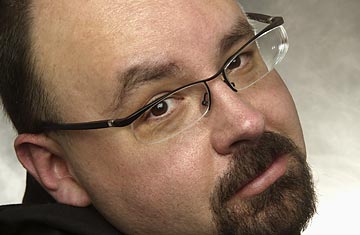
Carlos Ruiz Zafón
In The Angel's Game, Spanish novelist Carlos Ruiz Zafón's prequel to his mega-best-selling The Shadow of the Wind, a young writer in early 20th century Barcelona finds that he may have sold his talents and his soul to the worst of bidders. Pulpy, melodramatic and compulsively readable, The Angel's Game is the second of a proposed four books set in Barcelona. Ruiz Zafón spoke to TIME about his obsession with storytelling, the e-book revolution and why the media don't care about literature.
Both The Shadow of the Wind and The Angel's Game revolve
around this dark, magical place called the Cemetery of Forgotten Books.
Could you describe it and talk about when the idea for that very vivid place
popped into your mind?
The Cemetery of Forgotten Books is like the greatest, most fantastic
library you could ever imagine. It's a labyrinth of books with tunnels,
bridges, arches, secret sections — and it's hidden inside an old palace
in the old city of Barcelona. It's a secret place that very few people know
about, and in there you can find all of the books that have been lost, that
have been forgotten and that people have tried to destroy. This place is
maintained by a secret society of people that are trying to preserve books
and memories and ideas. It has been around probably for centuries. And the
thing is, the first time you are introduced to this place, you have the
right to choose one book from the hundreds of thousands in this huge
labyrinth. And when you pick that book, you become responsible for it, and
you have to make sure that it never disappears, that it's never
destroyed.
The idea came to me probably in the late '90s. I think it came from something that I was becoming aware of at the time, which was the destruction of memory, the destruction of history. I've always thought that we are what we remember, and the less we remember, the less we are. So thinking that and driving across the country and finding all these fantastic used bookstores that nobody was paying attention to — all these things were tumbling around my mind, and at some point I came up with this image of this place. It was clear that it was a visual metaphor, not just for forgotten books, but forgotten people and ideas.
These books are set in early to mid-20th century Barcelona. What is it
about that time period that intrigues you?
I'm fascinated by the period that goes from the Industrial Revolution to
right after World War II. There's something about that period that's epic
and tragic. There's a point after the industrial period where it seems like
humanity's finally going to make it right. There were advances in
medicine and technology and education. People are going to be able to live
longer lives; literacy is starting to spread. It seemed like finally, after
centuries of toiling and misery, that humanity was going to get to a
better stage. And then what happens is precisely the contrary. Humanity betrays itself.
Your characters are obsessed with books, partly because of the
Cemetery and partly because one of the other main settings is a
bookstore. Have you always surrounded yourself with books?
My childhood was surrounded by books and writing. From a very
early age I was fascinated by storytelling, by the printed word, by language,
by ideas. So I would seek them out. I didn't have access to a wonderful
bookstore like the one in the book, but in many ways what I've always been
doing is making up stories and characters. Even before I learned to read
and write, I was telling stories. I always knew that I was going to be a
writer because there was no other choice. I was always fascinated by the fact that you could take paper
and ink and create worlds, images, characters. It seemed like magic.
You say that you're enchanted by books and ink and paper — you seem
to place a premium on the printed word, the actual product. Have you given
much thought to how that might all change with e-books?
That's all about distribution. I don't think it has to do with books or
with literature or storytelling. The history of publishing has had this
evolution, where even if we go back to the 19th century, when some of the
greatest novels of all time were written, publishing was very different.
People were not necessarily buying books, they were reading stories in
installments and newspapers and magazines, and some of those stories would
later be compiled into volumes. But the entire culture of book-selling and
publishing was very different. What we know today is a product of the 20th
century. Where it is going in the future, I don't know. But I
think the nature of storytelling, of language, of literature will never
disappear because it's just part of human nature.
Is this conversation occurring in Spain and in Europe as well? Is this
as big a deal over there?
I don't think in Europe it's such a big deal. People are
talking about it, but I see much more concern in American publishing. I think a lot of it has to do with the way books and literature
are dealt with in the media. It's very hard in the mass media in the U.S. to get exposure for books. There's very little space, and a lot of
newspapers are shrinking their space. But if you go to Europe, you find that a lot of
newspapers and TV shows and radio shows are constantly featuring writers.
It's part of people's lives. Here it seems like only serious readers are concerned about those things.
Books and literature don't seem to be part of the
mainstream. Which is a shame.
